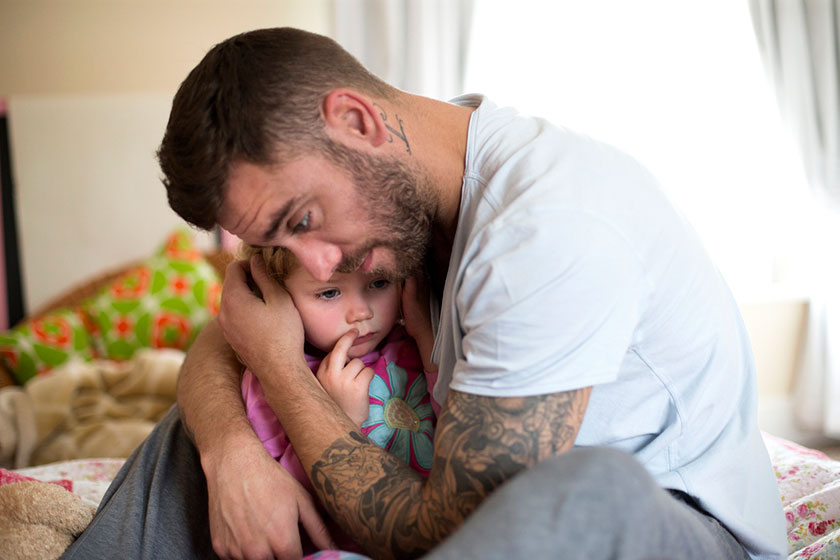A version of this article originally appeared on the National Fatherhood Initiative website, and is used here with permission. To learn more about the National Fatherhood Initiative, visit www.fatherhood.org.

There are 2.7 million children with a parent in prison or jail. Ninety-five percent of all inmates will eventually be released. Ninety-two percent of parents in prison are fathers. Most—two out of three inmates—will reoffend and be back in prison.
When it comes to fatherhood and prison, we are locking too many dads in jail with little to no help. The fathers behind bars are not connecting with their families from behind prison walls or upon release. These dads need help. They need our help or they are likely to reoffend.
THE FATHER ABSENCE CRISIS
The father absence crisis in America is real. When we talk about father absence, we mention the U.S. Census Bureau's statistic that 24 million children—one out of three—live without their dad in the home. Over 13,000 of you have viewed The Father Absence Crisis in America. We received lots of feedback on that post. Some readers said, "Great, now we know the problem; what's the solution?"
Well, the truth is, there's one answer: The solution to father absence is father presence.
HERE'S WHAT YOU NEED TO KNOW
- There is a crisis in America. According to the U.S. Census Bureau, 24 million children in America—one out of three—live without their biological dad in the home.
- There is a "father factor" in nearly all of the societal issues facing America today. We must realize there is a father absence crisis in America and begin to raise more involved, responsible, and committed fathers.
FATHERS BEHIND BARS: THE PROBLEM FOR AMERICA'S CHILDREN
Here is the problem related to father absence and prison in two stats:
- There are 2.7 million children with a parent in prison or jail
- Ninety-two percent of parents in prison are fathers
Having a parent who is incarcerated is now recognized as an "adverse childhood experience" (ACE), which is different from other ACEs because of the trauma, stigma, and shame it inflicts on children.
The number of children with a father in prison has grown by 79 percent since 1991.
INCARCERATION OFTEN SPANS GENERATIONS
- Fathers in prison are, overwhelmingly, fatherless themselves
- Youths in father-absent households have significantly higher odds of incarceration
- More than 650,000 ex-offenders are released from prison every year
- Fathers are returning to their families without the skills they need to be involved, responsible, and committed fathers
- Two-thirds of released prisoners, or 429,000, are likely to be rearrested within three years
ADVERSE CHILDHOOD EXPERIENCES*
- Physical abuse
- Sexual abuse
- Emotional abuse
- Physical neglect
- Emotional neglect
- Intimate partner violence
- Mother treated violently
- Substance misuse within household
- Household mental illness
- Parental separation or divorce
- Incarcerated household member
Source: Substance Abuse and Mental Health Services Administration
THE SOLUTION FOR AMERICA'S CHILDREN
The National Fatherhood Initiative's InsideOut Dad® program for incarcerated fathers connects dads in prison with their children, heart to heart. InsideOut Dad is the only evidence-based parenting program designed specifically for incarcerated fathers. An evaluation conducted by Rutger's University found that fathers who went through InsideOut Dad while in prison showed statistically significant increases in fathering knowledge and confidence/self-esteem compared to a control group.
InsideOut Dad addresses criminogenic needs, a key factor in:
- REDUCING RECIDIVISM
Reentry initiatives that contain NFI's fatherhood programs have been found to reduce recidivism by 37percent.We can all agree it is ideal for men to get out of prison or jail, become a successful, contributing member of society, and stay out. Giving incarcerated fathers a vision that they have a unique and irreplaceable role in the life of their child along with increased confidence and changes in attitude and skills is a powerful motivator for successful reentry. Fathers who are involved with, and connected with their children and families prior to release are less likely to return to jail or prison. In fact, some individual states have conducted evaluations that connect the use of IoD along with other interventions to reduced recidivism.
- MAINTAINING FACILITY SAFETY AND ORDER
It has been said, "Idleness is a devil’s workshop". Facility safety is of utmost importance in the corrections environment and benefits the Prison/Jail warden(s) as well as fellow inmates. Fatherhood Programs in particular can help to engage inmates and encourage good behavior. By connecting inmates to their role as a man, and specifically as a father, they are more engaged in that aspect of their life and in turn, can help to create a peaceful, contented environment as much as possible.In addition, men who participate in fatherhood groups often create a bond among members, which generates good morale. Good morale is important for safety and there are less disciplinary infractions.By connecting with their children, incarcerated fathers are motivated to maintain good behavior to keep visiting rights, which is beneficial for both the facility and correctional officers working with them. In addition, research shows that fathers who connect with their children (and families) prior to release have a higher likelihood of staying out of jail/prison.
FAMILY RELATIONSHIPS
InsideOut Dad also addresses the marital/family domain that is concerned with an offender's family relationships, including:
- Relationships with parents and siblings
- Marital history
- Absence of parents
- Parenting skills
- History of family abuse and criminality
- Involvement in child abuse
WHY DOES ALL OF THIS MATTER?
Well, because you and I are paying for what doesn't work and we have been for years.
It's time for a solution that's cost effective for taxpayers and facilities: InsideOut Dad program costs just $600 for the first 10 fathers, then sustained at only $10 per father. Because the program can contribute to reduced recidivism among fathers, the potential cost savings are huge. It costs an average of $29,000 per year to incarcerate a parent.
Please include attribution to www.fatherhood.org with this graphic.